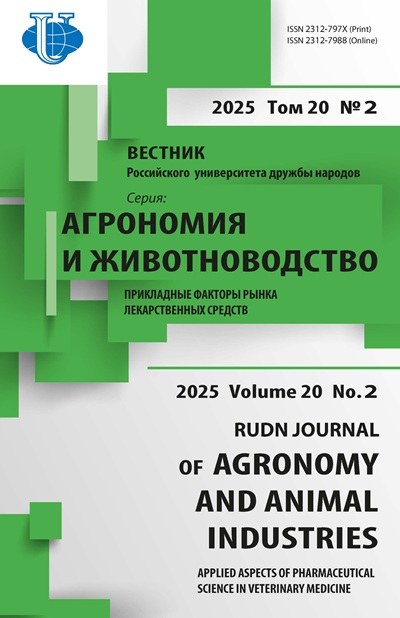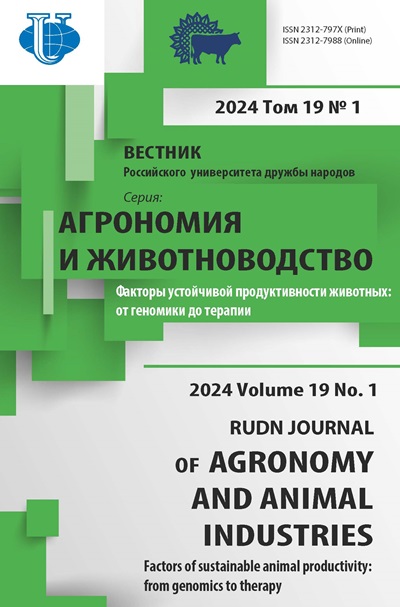From the editor
- Authors: Vatnikov Y.A.1
-
Affiliations:
- RUDN University
- Issue: Vol 19, No 1 (2024): Factors of sustainable animal productivity: from genomics to therapy
- Pages: 9-11
- Section: Factors of sustainable animal productivity: from genomics to therapy
- URL: https://agrojournal.rudn.ru/agronomy/article/view/19985
- ID: 19985
Cite item
Full Text
Abstract
-
Full Text
The scientific articles presented in the special topic of the issue reveal problems that are important for practical animal husbandry: influence of genetic factors and feeding conditions on physiological state of farm animals, their health and quality of products they produce.
In the article “Microsatellite analysis of Kalmyk cattle”, based on a study of genetic diversity of Kalmyk cattle populations using microsatellite gene analysis, the authors found that the studied Kalmyk herd has a high level of genetic diversity. Hence, this indicates the possibility of carrying out a high-quality selection of the most valuable producers in conditions of intensive marker selection of animals.
Increasing milk productivity of cattle using the timeless classical method of breeding animals was presented in the article “Ways to increase milk productivity of Red Gorbatov breed”. The authors described in detail the results of crossing animals of the Red Gorbatov breed with animals of the Angler and Red Danish breeds of cattle. The study revealed that crossbred animals were superior to purebred animals both in the amount of milk (5.7 to 12.5 %) and in the content of mass fraction of fat in milk (on average by 0.02 %). Although, it is necessary to note the high variability of characteristics within each group.
The issue of “Influence of mycotoxins on milk quality indicators in cows in the conditions of large livestock complex” remains relevant. The authors of the research showed a significant effect of high concentrations of mycotoxins in diets of lactating cows on metabolism of amino acids, deterioration of hematological and biochemical blood parameters, decrease in milk productivity and changes in quality parameters of milk. Bovine mastitis, as a negative factor that reduces milk productivity of cows and causes significant economic damage to processing industry enterprises, is quite widespread in dairy herds of cattle in the Russian Federation. In the article “Therapeutic efficacy of antimastitis drugs in the treatment of subclinical and clinical forms of mastitis in dairy cows” the authors studied the comparative effectiveness of veterinary antimastitis drugs in the treatment of subclinical and clinical mastitis in dairy cows. They concluded that the use of Mamikur as monotherapy for serous-catarrhal clinical and subclinical mastitis in cows is well tolerated by animals and gives a positive effect when administered intracisternally in the volume of one dispensing syringe three times with an interval of 12 hours. Also, in the research “Antimicrobial resistance of bovine mastitis pathogens” the authors analyzed 1206 milk samples from Holstein-Friesian cows for sensitivity to antimicrobial drugs on Muller — Hinton agar in modified Kirby — Bauer disk-diffusion method. It was established that constant monitoring of antimicrobial resistance of bovine mastitis pathogens contributes to more effective selection of therapy for clinical mastitis.
Thus, an integrated approach to solving problems of livestock husbandry, consisting of different but complementary components, is the key to an integral system of sustainable increase in animal productivity, which is necessary to ensure high human diet caloric content, optimal amount of available calories in safe food products. The most important of these components include analysis of genetic diversity of cattle populations, search for ways to increase milk productivity, and veterinary support at each stage of this complex process.
Yuri A. Vatnikov, editor-in-chief
About the authors
Yuri A. Vatnikov
RUDN University
Author for correspondence.
Email: vatnikov-yua@rudn.ru
D.Sc. in Veterinary Medicine, Professor, Director of Department of Veterinary Medicine, Agrarian and Technological Institute Moscow, Russian Federation
References
Supplementary files















